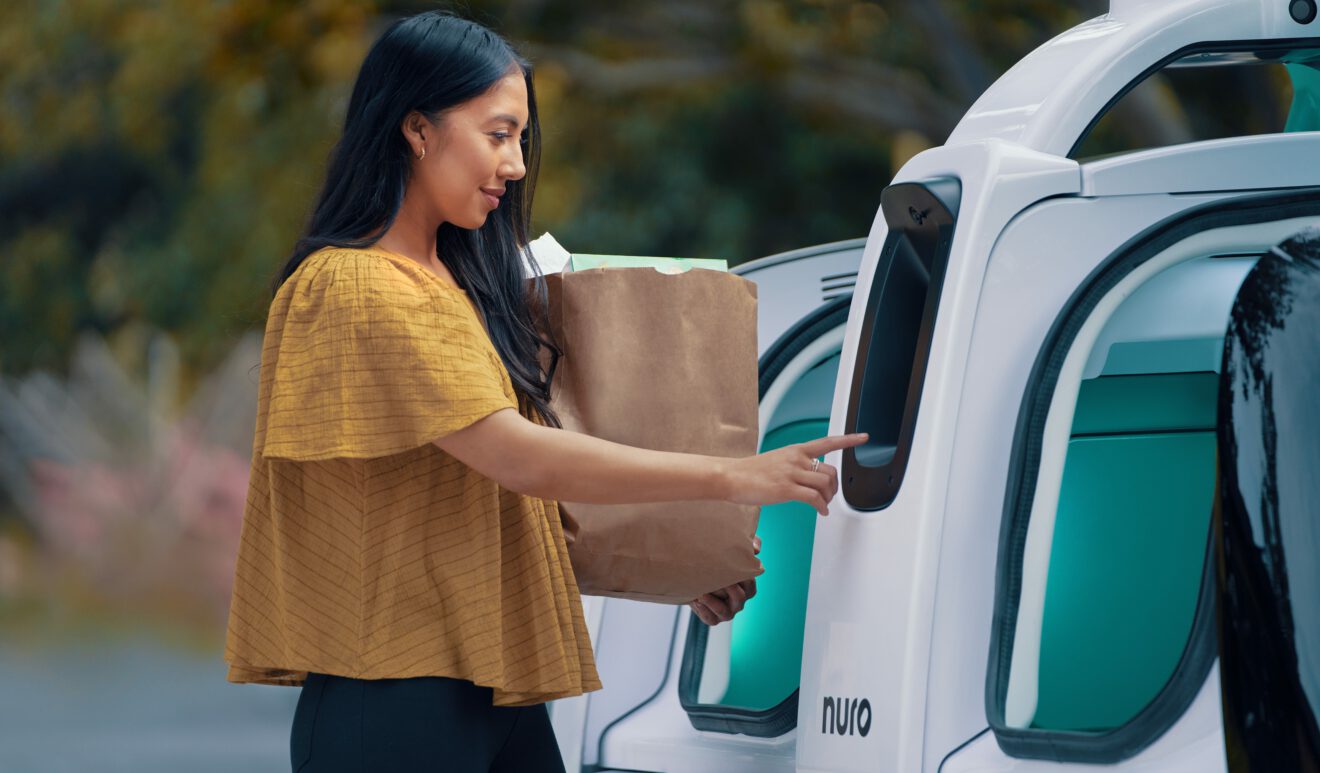Sign up for Consumer Brands SmartBrief today, free.
Food delivery has exploded in popularity over the past decade, and the surge in demand during the last two years has created an urgency for restaurants and delivery service providers to create faster and more affordable systems. Several of these businesses are tapping the autonomous delivery technology market to continue fulfilling customer orders in new and innovative ways.
“We expect to see increased demand for on-road autonomous delivery across all types of industries and businesses and we’re working to address that demand with our new vehicles designed to scale to millions of consumers across the US,” said Cosimo Leipold, head of partnerships at robotics company Nuro.
Nuro’s unmanned vehicles – which are some of the only fully approved to operate in California – are designed to deliver products in suburban areas, and the company has partnered with major retailers such as Walmart and Kroger. Delivery platform Uber Eats has also recently teamed up with Nuro to bring its autonomous delivery technology to Houston, Texas, and Mountain View, Calif.
While more driverless vehicles like Nuro’s are taking to the roads, other food delivery companies are taking to the skies. Unilever’s Ice Cream Shop has chosen drone company Flytrex as a delivery partner for the virtual store’s product offerings in North Carolina and Texas. This airborne method allows customers to receive their ice cream directly into their backyards in roughly three minutes.
“Flytrex is spearheading the effort to meet growing consumer on-demand expectations by allowing restaurants and retailers to integrate faster, safer, greener, more economical and sustainable last mile fulfillment than ever before,” said Yariv Bash, co-founder and CEO of Flytrex.
Autonomous delivery leads the way
The pandemic-related boost in food delivery shows no signs of slowing, so technology to improve these services is essential for the industry. Nuro’s mission is to cut down or entirely eliminate US consumers’ shopping trips made in personal cars through the company’s autonomous delivery vehicles.
“We have also found that it’s generally difficult for restaurants and other businesses to hire enough drivers to fill their delivery demand,” said Leipold. “Having the option of a robot or human driver allows restaurants to fill more orders.”
The human labor that manual delivery demand requires is nearly impossible to fulfill, so robotic solutions are the logical category to focus on to advance delivery services, especially in suburban areas. These neighborhoods are often not cost-effective or efficient for traditional delivery methods, so more than 82 million single-family households are currently an untapped market, according to Bash. Flytrex is directing its attention on this demographic for its drone deliveries for these reasons, he added.
“Restaurants that incorporate automated, end-to-end drone delivery can slash the typical cost of delivery by as much as 40%,” said Bash. “Because a single drone operator can monitor multiple delivery orders at once, businesses can satisfy customers’ demand for instant gratification while paying less for transportation costs.”
As consumers continue to prioritize sustainability, companies need to create systems that enable more eco-friendly purchasing decisions. Bash touts its electric drones for creating fewer carbon emissions and easing road traffic. Flytrex’s system allows remote operators to make several deliveries at the same time, and Bash also added that customers still see drone delivery as relatively uncommon, so watching the process of their items being flown directly into their own backyard is an enjoyable experience.
Partnerships allow retailers, restaurants to shine
The Ice Cream Shop deployed Robomart vans for delivery services earlier this year, but Unilever’s partnership with Flytrex is the brand’s first foray into drone delivery. Bash shared that Flytrex thought the partnership was ideal because of their alignment on improving efficiency for a time-sensitive product.
“Ultrafast food delivery is generally associated with providing fresh-out-of-the-oven hot food to customers,” he said. “But rapid delivery of freezing cold ice cream on a hot day is one and the same: no need to settle for a melted pint in an hour when you can have your ice cream via the skies cold and delicious!”
Leipold also lauded Nuro’s own recent partnership with Uber Eats because of both parties’ understanding of autonomous technology as well as the platform’s capacity to bring the technology to scale for independent eateries as well as major chains.
“Uber has a great culture of innovation and deep expertise in autonomous technology,” he added. “They understand the challenges and the benefits of autonomy and are as committed as we are at Nuro, to deploying autonomous vehicles on public roads with safety as the highest priority.”
He also emphasized that these tools are not a harbinger of replacing restaurant workers, but rather a reallocation of resources and time.
“Ultimately, we believe this technology will increase the overall market while creating more fulfilling jobs inside restaurants and in other roles besides delivery – and at the same time, lowering the cost of home delivery for consumers,” said Leipold.
Recent related stories:
- The changing face of plant-based dining in the digital age
- SmartSummit: The role of technology in restaurant recruitment and retention
- What defines the American meal? Protein, paper towels and TV
_____________________________________
If you liked this article, sign up for SmartBrief’s free email newsletter from the Consumer Brands Association. It’s among SmartBrief’s more than 250 industry-focused newsletters.
